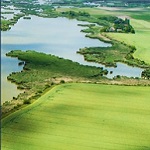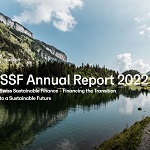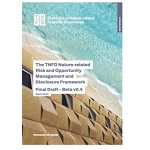| |
|
|
| |
|
|
| |
|
SSF Newsletter April 2023
|
| |
|
Thriving ecosystems urgently needed
|
| |
|
Dear Sir or Madam,
|
| |
|
According to the ICUN Red list in 2022, 9251 species were classed as critically endangered. Why should this matter to investors and financial service providers? Biodiversity, and the loss thereof, impacts the way we live and do business. Only fully functioning ecosystems can ensure that important ecosystem services thrive – providing for clean water, food, natural carbon sinks, resources for industrial products and many other essential components to a functioning economy and hence human wellbeing.
Given this, it is essential that nature is valued properly by investors. This can be done by translating nature into KPIs and metrics that can be valued alongside other factors in risk and opportunity analysis - something the Taskforce for Nature-related Financial Disclosure (TNFD) provides guidance for. The version “v0.4 final draft TNFD framework” was published at the end of March and SSF, as co-convenor of the Swiss Consultation Group to the TNFD, will again provide input before the final draft will be released later this year. SSF hopes that the TNFD will support the financial sector globally in valuing nature not merely as a box ticking excercise but as a pre-condition for sound business operations.
|
|
| |
|
|
Kind regards,
Veronica Baker
Project Manager
|
| |
|
|
|
| |
|
|
| |
| |
| |
|
SSF activities at a glance
|
| |
|
| |
|
Swiss Consultation Group TNFD Framework v0.4 Webinar
|
| |
|
As joint convenors of the Swiss Consultation Group on the TNFD, SSF and GCNSL hosted an informational webinar highlighting the newly released v0.4 TNFD Framework. Along with a general overview of the TNFD framework and the v0.4 specifically, Alison Bewick (Nestlé) and Renata Pollini (Holcim) spoke about their role in the TNFD taskforce and what they see as important improvements in the framework and key challenges still to solve.
|
| |
|
|
|
| |
| |
|
SSF Annual Report 2022
|
| |
|
The SSF Annual Report 2022 is now available! Read it in the interactive online format to gain an overview of our activities and priorities from the past year.
|
| |
|
|
|
| |
| |
|
SSF supports the Swiss Climate Law (KlG)
|
| |
|
On 18 June, the Swiss electorate will vote on the adoption of the federal law on climate protection goals, innovation and strengthening energy security (KlG). The KlG provides a clear framework for the financial industry to actively support the energy transition through investments and it helps to reduce climate risks in Switzerland. SSF officially supports the KIG in the public vote and encourages our members to do the same. More information on the KIG and reasons to support it here.
|
| |
|
|
|
| |
| |
|
Register now for the SSF Annual Conference!
|
| |
|
On the 22 June 2023 in Bern, SSF will be hosting our Annual Conference, with the the theme of “How to accelerate the transition”. Register here to join us in listening to the great line-up of speakers including State Secretary Daniela Stoffel and Swisscom CEO Christoph Aeschlimann.
|
| |
|
|
|
| |
|
|
| |
| |
|
Regulatory and market news
|
| |
|
| |
|
International News
- The UK Government has published their 2023 Green Finance Strategy, which focuses on investment in the green economy, financial stability, incorporation of nature and international alignment on goals. Among the additional documents published is a consultation of ESG rating providers and the planned regulation.
- The European Insurance and Occuptational Pensions Authority (EIOPA) published a paper on nature related risks and impacts for insurance, which is the first step in their process of establishing supervisory expectations for the management of nature-related risks and impacts in the insurance sector.
Market News
- Several large insurers, including Zurich and Munich Re, have pulled out of Net-Zero Insurance Alliance (NZIA) in the past month. Both companies state that they will continue to pursue a transition to net zero, but cite antitrust rules (Munich Re) and a refocusing of resources towards customers (Zurich) as main reasons.
- At the start of April the Integrity Council for Voluntary Carbon Market, an independent governance body, launched a global benchmark certification programme, which aims to create a “regulated-like market” for carbon credits. To achieve accreditation, carbon credit programmes must meet the requiremens of the Core Carbon Principles (CCP), focusing on governance, emissions and sustainable development.
- Following the launch of the TNFD Framework v0.4 at the end of March, the TNFD have also published a hypothetical case study for “Bank of Nature” to demonstrate how a bank may incorporate LEAP into its activities.
- In the 11th Global Green Finance Index published last week, Geneva gained 3 ranks to land on rank 4, while Zurich lost one rank to be placed on rank 12. Both financial centers improved their absolute rating in this index based on the perception of market participants.
|
|
| |
|
| |
| |
|
New members and network partners
|
| |
|
| |
|
We are happy to welcome the following organisations as new SSF member:
The full list of our members and network partners, now standing at 236, can be found here.
|
|
| |
|
|
|
|
|
| |
| |
|
SSF and sustainable finance in the media
|
| |
|
|
|
|
|
| |
|
The TNFD Nature-related Risk and Opportunity Management and Disclosure Framework v0.4
|
| |
|
Nature loss poses a major risk to businesses, while moving to nature-positive investments offers opportunity. The market-led, science-based TNFD framework will enable companies and financial institutions to integrate nature into decision making. In this latest draft, the v0.4, market participants can see a full representation of the framework, including examples of additional guidance by sector and biome. The framework consists of recommended disclosure metrics, the LEAP approach to identifying intersections with nature and guidance on core definitions and concepts, metrics and targets.
|
|
More >
|
| |
| |
|
|
|
| |
| |
|
Kind Regards,
The SSF Team
|
| |
|
|
|
| |
| |
|
Already a member or partner? Make sure you are featured on our website. Get in touch with us to upload your member or network partner profile now.
Interested in joining our network of members and partners? > Learn more
|
| |
|
|
|
| |
| |
|
SWISS SUSTAINABLE FINANCE
|
|
|
| |
|
|
| |
|
|
| |
|
|
| |
|
|
| |
|
|











